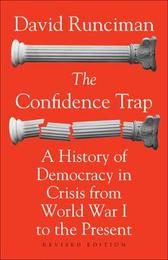
|
The Confidence Trap: A History of Democracy in Crisis from World War I to the Present - Revised Edition
Paperback / softback
Main Details
| Title |
The Confidence Trap: A History of Democracy in Crisis from World War I to the Present - Revised Edition
|
| Authors and Contributors |
By (author) David Runciman
|
|
Preface by David Runciman
|
| Physical Properties |
| Format:Paperback / softback | | Pages:416 | | Dimensions(mm): Height 216,Width 140 |
|
| Category/Genre | World history |
|---|
| ISBN/Barcode |
9780691178134
|
| Classifications | Dewey:321.8 |
|---|
| Audience | |
|---|
| Edition |
Revised edition
|
|
Publishing Details |
| Publisher |
Princeton University Press
|
| Imprint |
Princeton University Press
|
| Publication Date |
31 October 2017 |
| Publication Country |
United States
|
Description
Why do democracies keep lurching from success to failure? The current financial crisis is just the latest example of how things continue to go wrong, just when it looked like they were going right. In this wide-ranging, original, and compelling book, David Runciman tells the story of modern democracy through the history of moments of crisis, from t
Author Biography
David Runciman is professor of politics at the University of Cambridge and a fellow of Trinity Hall. His books include The Politics of Good Intentions and Political Hypocrisy (both Princeton). He writes regularly about politics for the London Review of Books.
Reviews"His rich and refreshing book will be of intense interest to anyone puzzled by the near paralysis that seems to afflict democratic government in a number of countries, not least the United States. Runciman's account of the workings of the confidence trap--the belief that democracy will always survive--will serve as an antidote to the moods of alarm and triumph by which writers on democracy are regularly seized."--John Gray, New York Review of Books "Runciman's book abounds with fresh insights, arresting paradoxes, and new ways of posing old problems. It is part intellectual history, an absorbing study of the modern debate on democracy through the contrasting perspectives of key public intellectuals, such as Walter Lippmann, George F. Kennan, Francis Fukuyama and Friedrich Hayek, and part analysis of the problem of political leadership in democracies, explored through the decisions taken by leaders, particularly US presidents, and the constraints under which they operate."--Andrew Gamble, Times Literary Supplement "[An] ingenious account of how free nations faced seven international crises from 1918 to 2008... Runciman concludes that democracy will probably survive, having made a delightfully stimulating, if counterintuitive case, that the unnerving tendency of democracies to stumble into crises is matched by their knack for getting out of them."--Publishers Weekly "[A] historically sensitive and subtle response to the democratic crisis."--Thomas Meaney and Yascha Mounk, The Nation "If you think American democracy doesn't work these days, you have to read this well-written book."--Fareed Zakaria, Fareed Zakaria GPS "Book of the Week" "[B]rilliantly and convincingly delivered. The big story of mature democracies in crisis is told with remarkable confidence and brio. Runciman writes lucidly and compellingly: this is a book that you cannot put down."--Georgios Varouxakis, Standpoint "As a corrective to the doom-and-gloomsters, this book makes some telling points, and he is a clear and forceful writer... What Runciman's focus on American democracy helps to do is to remind us that there is an international dimension to this subject that is closely connected to American self-perceptions."--Mark Mazower, Financial Times "Runciman's writing, often brilliantly aphoristic, is full of insights, opinions, and phrasings that will challenge and delight scholars and general readers both."--Robert Nardini, Library Journal (Starred Review) "Refreshingly free of received and rehearsed wisdoms, Runciman doesn't tiptoe around sacred cows and invites us to take part in that most adult way of thinking: to examine contradictory ideas in tandem and ponder what the dissonance amounts to... [H]e argues lucidly, persuasively, even exhilaratingly at times. The nightly news will never appear exactly the same again."--Miriam Cosic, Australian "[Runciman] is a trenchant commentator on current affairs and a historian of political thought who, in his books and his articles in the London Review of Books, has revealed himself to be a gifted explainer... [H]e has a canny sense of how political power operates at its highest levels and in his exposition of political theory he is unfailingly clear and direct. Runciman's prose is conversational, if elegantly so--it is no surprise that he is a fluent lecturer--and characterised by a wry restraint."--Daniel Cohen, Los Angeles Review of Books "[E]xcellent and interesting... [A]dmirable and very well written."--Chris Patten, Tablet "Runciman is a good writer and brave pioneer... The picture he sketches is agreeably bold."--John Keane, Sydney Morning Herald "What we get here is good history. The events at the seven junctures are presented in a way that is learned, concise and informative."--Stein Ringen, International Affairs "Runciman is skilled at bringing important political questions 'out of the clouds' and presenting them in a manner that is clear, engaging, and approachable... This is an extraordinarily well-written and engaging book that asks important questions about structural strengths and weaknesses of democratic governance."--Choice
|